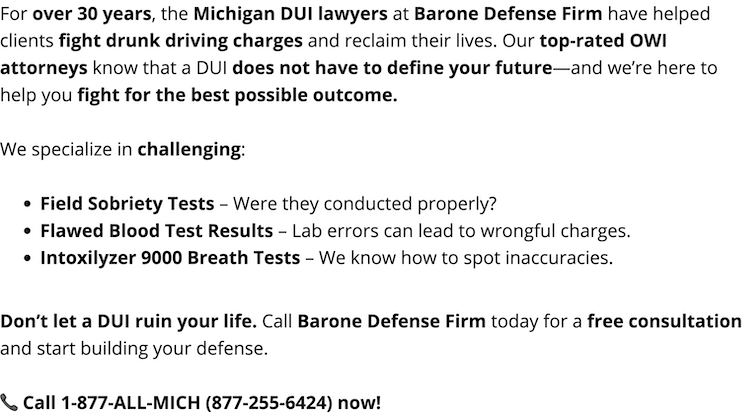DUI Vehicular Manslaughter
In Michigan, a person may be charged with vehicular manslaughter if he or she causes the death of another person while operating while intoxicated (OWI). As a felony offense, the punishment for Michigan OWI vehicular manslaughter includes long-term imprisonment in addition to other serious penalties. With so much at stake, having an experienced defense lawyer on your side is imperative if you have been charged with this crime.
Until its repeal in January 9, 2009, vehicular homicide in Michigan was classified as "negligent homicide.” See the now-repealed statute MCL 750.324. Thus, what was once considered vehicular homicide is now either DUI causing death, reckless driving causing death (MCL 257.626(4)) and moving violation causing death (MCL 257.601d).
Note that the intoxication element of DUI can be caused by the consumption of alcohol, drugs, or any combination of both. See this article on the two theories of DUI in Michigan for further details.
Potential PenaltiesIf convicted of Michigan OWI vehicular manslaughter, you could be sentenced to up to 15 years in prison as well as expensive fines and a lifetime license revocation. Your felony conviction will also be reported on your criminal record, causing difficulty when applying for employment, schools, and housing. As a convicted felon, you will be barred from voting or even owning a gun.
In an OWI vehicular manslaughter case, the prosecution must prove that the defendant caused the accident that resulted in death and that he or she was under the influence of alcohol and/or drugs. While it may seem like winning an OWI vehicular manslaughter case is impossible, it can be done with the right defense lawyer on your side.
Factors Affecting Your Charges and PenaltiesDUI vehicular manslaughter charges involve more than simple poor judgment on your part. Rather, the arresting police officer noticed and recorded evidence of intoxication that led to the death of another person. A vehicular manslaughter conviction, more properly called DUI Causing Death can lead to aggressive penalties, including up to $10,000 in fines and up to 15 years in prison.
However, these penalties may actually increase if certain factors are involved. If, for example, your blood alcohol content came in at 0.17 or more or if the person killed in the accident was an emergency response provider, then you could actually face more time in prison and greater fines. If a minor was in the vehicle with you at the time of the accident or you were driving without a proper license or insurance, these factors could affect your penalties.
Punishment for Reckless Driving Causing DeathThe statute on reckless driving causing death stipulates that, "beginning October 31, 2010, a person who operates a vehicle in violation of subsection (2) and by the operation of that vehicle causes the death of another person is guilty of a felony punishable by imprisonment for not more than 15 years or a fine of not less than $2,500.00 or more than $10,000.00, or both."
Notably, the penalties for reckless driving causing death mirror those for Operating While Intoxicated (OWI) causing death.
However, the prosecution must establish, beyond a reasonable doubt, that the individual was intentionally driving with wilful and wanton disregard for the safety of others. This higher burden of proof distinguishes reckless driving causing death from other vehicular offenses, requiring evidence of intentional and egregious negligence.
Other Consequences to ConsiderAs serious as the legal consequences can be from a DUI manslaughter charge and conviction, they aren't the only way your life can be affected. You may, for instance, lose your job or, if not, at least lose the opportunity for promotion. Finding future jobs could also be more difficult with a felony conviction on your record.
So if you need support with a DUI manslaughter case, call on Barone Defense Firm to help you navigate the consequences.
How a Lawyer Can HelpYour lawyer can consult with an accident reconstruction specialist to collect evidence about the events that led to the collision. This may include returning to the scene to look for tire marks, interviewing eye witnesses, and examining the vehicles to determine if any parts were faulty. If this specialist finds that you were not responsible for the crash, this can go a long way in proving your defense.
An attorney experienced with OWI will also have the training and background necessary to review your blood alcohol content (BAC) results. If the breathalyzer machine was not maintained or calibrated according to the manufacturer specifications or the officer did not administer the test correctly, your lawyer may be able to successfully challenge this evidence. If he or she can prove that you were not intoxicated, your case could be dismissed or your charges may be reduced.
Because it takes a long time to investigate a "causing death or serious injury" drunk driving case, it often takes a long time before your breath or blood is tested. The prosecutor is likely to call a witness to relate this later test to the time of driving. This is called retrograde extrapolation. It is important to select a lawyer who is well trained and who understands alcohol metabolism and can fight against this retrograde extrapolation evidence.
Building a DefenseAt The Barone Defense Firm, we handle Michigan OWI vehicular manslaughter cases with compassion. With years of experience in OWI defense, we have helped many citizens obtain a favorable outcome for their case. Offering reasonable attorney fees, we also provide a number of payment plan options so you can have skilled representation on your side during this time.
 Barone Defense Firm Home
Barone Defense Firm Home




















